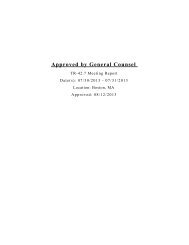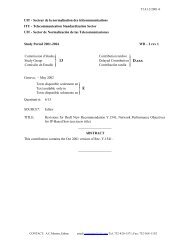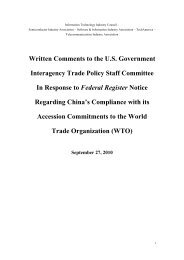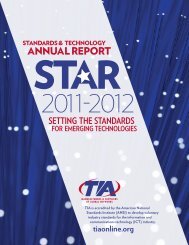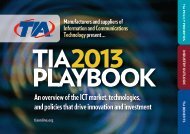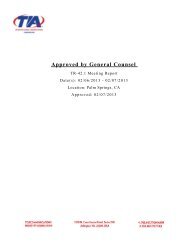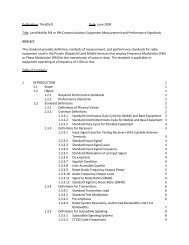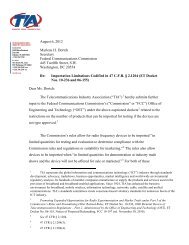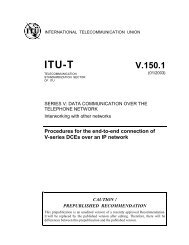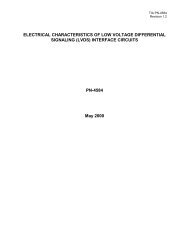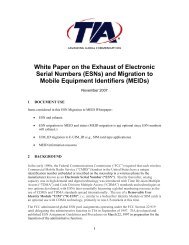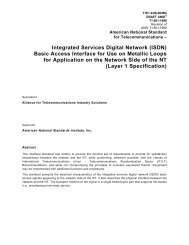Comments on China's Draft Telecom Law - Telecommunications ...
Comments on China's Draft Telecom Law - Telecommunications ...
Comments on China's Draft Telecom Law - Telecommunications ...
You also want an ePaper? Increase the reach of your titles
YUMPU automatically turns print PDFs into web optimized ePapers that Google loves.
Internet domain name resources by filing them and putting them <strong>on</strong> record. Can Chinaclarify what is intended by this Article that the State will not have a deciding role in thedomain name approval and registrati<strong>on</strong>?Chapter 5 – <strong>Telecom</strong>municati<strong>on</strong> Service FeesArticle 34. We support China’s decisi<strong>on</strong> to hold public hearings in soliciting opini<strong>on</strong>s <strong>on</strong>the setting of upper limits <strong>on</strong> telecommunicati<strong>on</strong>s service fees where there is inadequatecompetiti<strong>on</strong>. Public comment is a valuable tool for governments to best gauge c<strong>on</strong>sumerand industry views in designing policies. We encourage China to establish a publiccomment process for all telecommunicati<strong>on</strong>s regulatory decisi<strong>on</strong>s undertaken in China.Chapter 6 – Universal <strong>Telecom</strong>municati<strong>on</strong> Service and Protecti<strong>on</strong> of Subscribers’Rights and InterestsArticle 38. We suggest that universal telecommunicati<strong>on</strong>s service be defined as beingprovided to all users, including Chinese citizens, Chinese legal pers<strong>on</strong>s, foreign legalpers<strong>on</strong>s and foreign individuals who have a legal operati<strong>on</strong> in China.Article 39. Like many countries, China recognizes the importance of expandingtelecommunicati<strong>on</strong> services into n<strong>on</strong>-commercially viable areas. The Universal ServiceFund should explicitly provide assurance that designated operators for universal servicewill be compensated for providing service to areas that are not commercially viable.In support of universal services, China should adopt more market-driven and technologyneutralapproaches in allocating scarce telecom resources such as radio frequencyspectrum. License-exempt use of radio frequency spectrum (such as 2.4 GHz Wi-Fiservices) has proven to be hugely successful in proliferating Internet access andstimulating service innovati<strong>on</strong>. The same license-exempt model could be applied to morefrequency bands in order to support more cost-effective rural coverage and bring downthe overall cost of implementing universal services.Article 43. In the interest of empowering the c<strong>on</strong>sumer, it would be useful to includesubscriber requests into the requirement of service providers when requiring numberportability. Steps clarifying number portability opti<strong>on</strong>s and time frames would bebeneficial to creating competiti<strong>on</strong> for c<strong>on</strong>sumers.Article 49. Industry recognizes the potential benefits of a real-name registrati<strong>on</strong> scheme,and appreciates the provisi<strong>on</strong> in this article for protecti<strong>on</strong> of subscriber informati<strong>on</strong>.However, the vast majority of new mobile subscribers in China is composed of prepaidusers who are currently without real-name registrati<strong>on</strong>. Retrofitting such requirements tomilli<strong>on</strong>s of existing prepaid users could be an impractical exercise. Furthermore, it isimportant to understand better how to determine if a telecom service would require aregistrati<strong>on</strong> process for network access (and hence require real name registrati<strong>on</strong>). Areal-name registrati<strong>on</strong> system also has limitati<strong>on</strong>s, given the possibility of identity theft<strong>on</strong> the Internet.



